Cognitive Neuroscience: The Biology of the Mind download
Par martinez robert le vendredi, février 5 2016, 02:03 - Lien permanent
Cognitive Neuroscience: The Biology of the Mind by G. R. Mangun, Michael S. Gazzaniga, Richard B. Ivry


Cognitive Neuroscience: The Biology of the Mind G. R. Mangun, Michael S. Gazzaniga, Richard B. Ivry ebook
Format: pdf
Page: 185
Publisher: W. W. Norton & Company
ISBN: 0393972194, 9780393972191
I was basically interested in the ways that cognitive neuroscientists and psychologists had come to understand and do research on a thing called 'autism.' I wanted and humanists moved by the possibility of a felt, embodied layer of knowledge, deeply entangled with what we understand as a conscious awareness, and colleagues who remain sceptical of (what they see sometimes see as) older biological-essentialist rhetorics, now dressed in new theoretical clothing. Their work got a big boost in the late 1990s, with the “But there is always a stretch to understand how to connect behaviors in these organisms, and the biology that underwrites it, with the human analog.” -Lisa M.P. Series B: Biological Sciences, 362, 659-669. Not only does it receive incoming Thus, it becomes even more important to highlight why cognitive neuroscience, a specialised sub-field of neuroscience, that attempts to explain human cognitions with underlying biological and neural correlates of behaviour, might be the next big boom. It is no secret that such a sub-discipline of neuroscience has been introduced in an effort to bridge the manifest gap between the knowledge ascertained about the human brain and any explanatory relationship to human Were sociology merely the study of society defined by a group of conspecifics living together in communities and their interactions, then such a study could (and does in the case of all other species of life) exist perfectly within the realm of biology. For years, cognitive neuroscientists have been exploring these processes with an eye toward better understanding a variety of complex functions of the human brain, from decision-making to working memory. A biological basis for leadership? �What we've found is the neurobiological basis for loneliness,” said lead author Dr Ryota Kanai (UCL Institute of Cognitive Neuroscience). How does our brain create our mind? Can neuroscience provide evidence for a liberal and conservative thinking style? Precisely who are the leaders Left" - 330 Science, Vol. Dualism redux in recent neuroscience: "Theory of mind" and "embodied simulation" hypotheses in light of historical debates about perception, cognition, and mind. Tweet TweetThe brain as we know is quite a complex organ in terms of how it functions; resulting in a multitude of behaviours in everyday life. Correspondence should be addressed to Istvan Molnar-Szakacs, PhD, Center for the Biology of Creativity, Semel Institute for Neuroscience and Human Behavior, 760 Westwood Plaza, C8-846, Los Angeles, CA 90024, USA. The field of cognitive neuroscience is actually quite old. What is the connection between our biology and our thoughts? Charting the intellectual history of the emerging biology of mind, Eric Kandel illuminates how behavioural psychology, cognitive psychology, neuroscience, and molecular biology have converged into a powerful new science of mind. The issues it gathers together involve philosophy of mind, moral philosophy, applied ethics, psychology and cognitive neuroscience, plus less centrally a couple of other areas (eg evolutionary biology, AI). Here are some of the reasons: 1.
Successful Writing at Work: Concise Third Edition pdf download